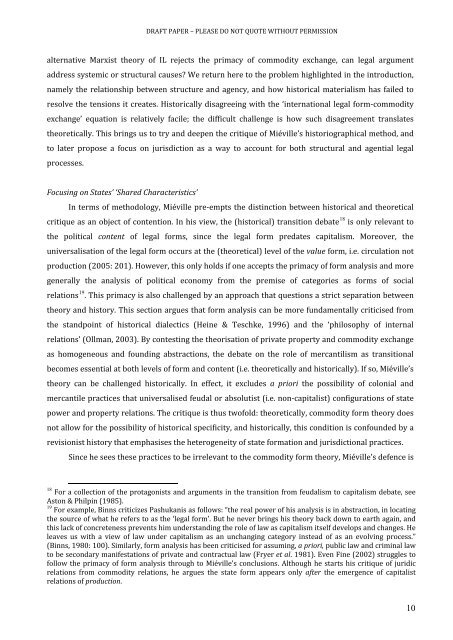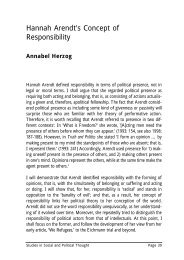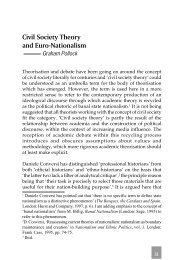Historical Materialism and International Law - University of Sussex
Historical Materialism and International Law - University of Sussex
Historical Materialism and International Law - University of Sussex
Create successful ePaper yourself
Turn your PDF publications into a flip-book with our unique Google optimized e-Paper software.
DRAFT PAPER – PLEASE DO NOT QUOTE WITHOUT PERMISSION<br />
alternative Marxist theory <strong>of</strong> IL rejects the primacy <strong>of</strong> commodity exchange, can legal argument<br />
address systemic or structural causes? We return here to the problem highlighted in the introduction,<br />
namely the relationship between structure <strong>and</strong> agency, <strong>and</strong> how historical materialism has failed to<br />
resolve the tensions it creates. <strong>Historical</strong>ly disagreeing with the ‘international legal form-commodity<br />
exchange’ equation is relatively facile; the difficult challenge is how such disagreement translates<br />
theoretically. This brings us to try <strong>and</strong> deepen the critique <strong>of</strong> Miéville’s historiographical method, <strong>and</strong><br />
to later propose a focus on jurisdiction as a way to account for both structural <strong>and</strong> agential legal<br />
processes.<br />
Focusing on States’ ‘Shared Characteristics’<br />
In terms <strong>of</strong> methodology, Miéville pre-empts the distinction between historical <strong>and</strong> theoretical<br />
critique as an object <strong>of</strong> contention. In his view, the (historical) transition debate 18 is only relevant to<br />
the political content <strong>of</strong> legal forms, since the legal form predates capitalism. Moreover, the<br />
universalisation <strong>of</strong> the legal form occurs at the (theoretical) level <strong>of</strong> the value form, i.e. circulation not<br />
production (2005: 201). However, this only holds if one accepts the primacy <strong>of</strong> form analysis <strong>and</strong> more<br />
generally the analysis <strong>of</strong> political economy from the premise <strong>of</strong> categories as forms <strong>of</strong> social<br />
relations 19 . This primacy is also challenged by an approach that questions a strict separation between<br />
theory <strong>and</strong> history. This section argues that form analysis can be more fundamentally criticised from<br />
the st<strong>and</strong>point <strong>of</strong> historical dialectics (Heine & Teschke, 1996) <strong>and</strong> the ‘philosophy <strong>of</strong> internal<br />
relations’ (Ollman, 2003). By contesting the theorisation <strong>of</strong> private property <strong>and</strong> commodity exchange<br />
as homogeneous <strong>and</strong> founding abstractions, the debate on the role <strong>of</strong> mercantilism as transitional<br />
becomes essential at both levels <strong>of</strong> form <strong>and</strong> content (i.e. theoretically <strong>and</strong> historically). If so, Miéville’s<br />
theory can be challenged historically. In effect, it excludes a priori the possibility <strong>of</strong> colonial <strong>and</strong><br />
mercantile practices that universalised feudal or absolutist (i.e. non-capitalist) configurations <strong>of</strong> state<br />
power <strong>and</strong> property relations. The critique is thus tw<strong>of</strong>old: theoretically, commodity form theory does<br />
not allow for the possibility <strong>of</strong> historical specificity, <strong>and</strong> historically, this condition is confounded by a<br />
revisionist history that emphasises the heterogeneity <strong>of</strong> state formation <strong>and</strong> jurisdictional practices.<br />
Since he sees these practices to be irrelevant to the commodity form theory, Miéville’s defence is<br />
18 For a collection <strong>of</strong> the protagonists <strong>and</strong> arguments in the transition from feudalism to capitalism debate, see<br />
Aston & Philpin (1985).<br />
19 For example, Binns criticizes Pashukanis as follows: “the real power <strong>of</strong> his analysis is in abstraction, in locating<br />
the source <strong>of</strong> what he refers to as the ‘legal form’. But he never brings his theory back down to earth again, <strong>and</strong><br />
this lack <strong>of</strong> concreteness prevents him underst<strong>and</strong>ing the role <strong>of</strong> law as capitalism itself develops <strong>and</strong> changes. He<br />
leaves us with a view <strong>of</strong> law under capitalism as an unchanging category instead <strong>of</strong> as an evolving process.”<br />
(Binns, 1980: 100). Similarly, form analysis has been criticised for assuming, a priori, public law <strong>and</strong> criminal law<br />
to be secondary manifestations <strong>of</strong> private <strong>and</strong> contractual law (Fryer et al. 1981). Even Fine (2002) struggles to<br />
follow the primacy <strong>of</strong> form analysis through to Miéville’s conclusions. Although he starts his critique <strong>of</strong> juridic<br />
relations from commodity relations, he argues the state form appears only after the emergence <strong>of</strong> capitalist<br />
relations <strong>of</strong> production.<br />
10
















